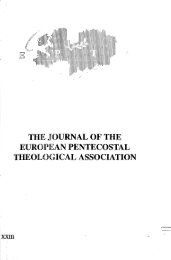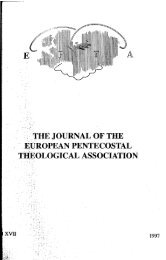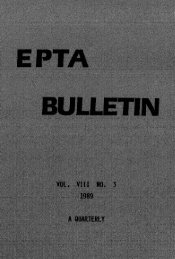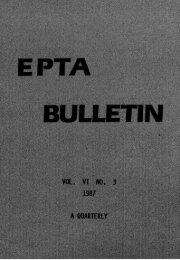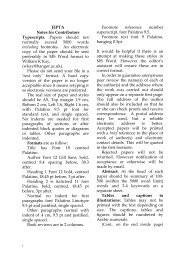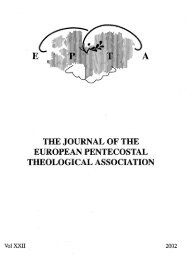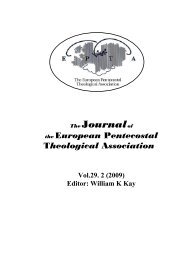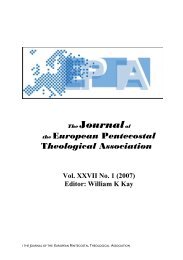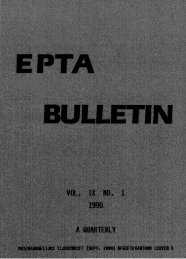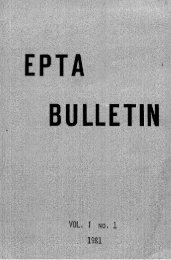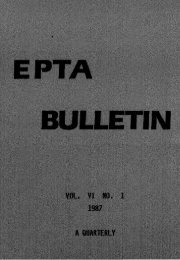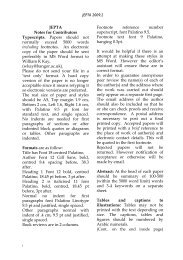jepta 2001 21 - European Pentecostal Theological Association
jepta 2001 21 - European Pentecostal Theological Association
jepta 2001 21 - European Pentecostal Theological Association
You also want an ePaper? Increase the reach of your titles
YUMPU automatically turns print PDFs into web optimized ePapers that Google loves.
Roman Catholic-<strong>Pentecostal</strong> Dialogue:<br />
Some <strong>Pentecostal</strong> Assumptions<br />
Cecil M. Robeck, Jr.<br />
It is an honor for me to have been invited to address the members of the <strong>European</strong><br />
<strong>Pentecostal</strong> <strong>Theological</strong> <strong>Association</strong> during the first year of the third "Christian"<br />
millennium.' It is an honor, because I am not a citizen of Europe, though over the<br />
past decade I have averaged about six weeks a year in Europe. It is an honor,<br />
because I have subscribed to the EPTA Bulletin, now the Journal of the <strong>European</strong><br />
<strong>Pentecostal</strong> <strong>Theological</strong> <strong>Association</strong> from the time of its inception, and I have<br />
read your papers and listened in on your conversations for two decades. I have<br />
learned a great deal from you and I am thankful to have had that opportunity.<br />
It is also an honor to be asked to address you on the topic of the International<br />
Roman Catholic-<strong>Pentecostal</strong> Dialogue. I have been a member of that Dialogue<br />
since 1985, and I have served as co-chair of the Dialogue since 1992. Through<br />
my years of involvement with the Dialogue, I have found that <strong>Pentecostal</strong>s as<br />
well as many Evangelicals have questions about it, some of which are based upon<br />
a genuine interest in these discussions. Others are based upon ignorance of the<br />
situation, or they arise out of personal pain, or out of fear of what might be its<br />
outcome. It is my hope that in this short presentation I will be able to answer<br />
some of your questions about why I am involved in this Dialogue. I also hope<br />
that this short introduction will facilitate a fruitful discussion concerning the<br />
Dialogue itself, and perhaps raise interest on the part of other <strong>European</strong><br />
<strong>Pentecostal</strong> groups becoming part of that discussion.<br />
As we begin our time together, I want you to understand four things about me.<br />
First, I am a committed classical <strong>Pentecostal</strong> both by experience and by tradition.<br />
I do not make any apologies for being <strong>Pentecostal</strong>, nor will I compromise on the<br />
core essentials of what it means for me. I believe that my <strong>Pentecostal</strong> experience<br />
and training have contributed significantly to my ability to serve successfully in<br />
the International Roman Catholic-<strong>Pentecostal</strong> Dialogue and elsewhere in the<br />
global Church. It is <strong>Pentecostal</strong>s who brought me to faith, <strong>Pentecostal</strong>s who have<br />
nurtured me in my faith my entire life, and <strong>Pentecostal</strong>s who taught me that<br />
regardless of the personal cost involved, I was to be faithful to whatever call God<br />
gave to me. The latter part has been the most difficult to live out, especially<br />
when <strong>Pentecostal</strong>s have not always understood the call that God has given to me,<br />
or even agreed that God could have given such a call. In any case, I have tried to<br />
be faithful to my heritage, and 1 have allowed my leaders to discern, with me,<br />
what God has said to me regarding my call to ecumenical ministry.<br />
Second, I am by training, a historical-theologian. I focused my studies in the<br />
' Paper presented at the EPTA Conference, Bucharest, Romania, April <strong>2001</strong>.



